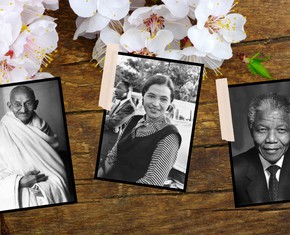The views expressed in our content reflect individual perspectives and do not represent the authoritative views of the Baha'i Faith.
Did you know that God asks questions? “Where?” you may ask. “Why?”
In this “Transforming Time” series, we’ve tried to show how godly perfections—as we are reminded by them by the Baha’i calendar itself—can be translated into goodly deeds.
Surprisingly, “Questions” (in Arabic: masāʼil ) is presented by the Bab—who created what is now the Baha’i Calendar—as an attribute of God. So let’s look at this unusual and remarkable “Name of God.”
In saying that “God asks questions,” this refers to various scriptures that represent God as posing a question for a divine purpose. It’s not actually that God is personally asking a question, since God is not a person—even though we experience God personally.
The Baha’i teachings view God as an unknowable essence. I like to say, “God is the supreme mystery with the greatest number of clues!” These clues—the marvelous traces of the grandeur of the Great Being found throughout our world—reflect the supreme Intelligence that designed our universe.
The “person” of God is what Baha’is call the manifestation of God—the prophets and messengers that have founded the world’s Faiths. In other words, God communicates to us through the various messengers of God, who have appeared at key moments throughout history to spiritualize and guide humankind.
Foremost among these ambassadors, interlocutors, proxies, teachers and exemplars of God are the founders of the great world religions, who have revealed scriptures, and which have taken the form of various holy books that we can easily read on the Internet today.
So, in saying that “God asks questions,” this simply means that, from time to time in various scriptures, God is represented as posing questions, giving pause for thought. Here’s one example:
And they [Adam and Eve] heard the voice of the Lord God walking in the garden in the cool of the day: and Adam and his wife hid themselves from the presence of the Lord God amongst the trees of the garden. And the Lord God called unto Adam, and said unto him, Where art thou? And he said, I heard thy voice in the garden, and I was afraid, because I was naked; and I hid myself. And he said, Who told thee that thou wast naked? Hast thou eaten of the tree, whereof I commanded thee that thou shouldest not eat? And the man said, The woman whom thou gavest to be with me, she gave me of the tree, and I did eat. And the LORD God said unto the woman, What is this that thou hast done? And the woman said, The serpent beguiled me, and I did eat. – Genesis 3:8–13. (Questions italicized)
Here, the statement that “the Lord God walking in the garden in the cool of the day” is a metaphor for “the presence of the Lord God.” Otherwise, the idea that God took a stroll in the Garden of Eden, looking for Adam and Eve and asking their whereabouts after failing to find them, stretches credulity. A literal interpretation of this passage leads to certain absurdities. To understand its deepest meaning, we must read this narrative spiritually.
This instance of God asking questions is familiar to most Jews and Christians. Let’s now look at another instance, familiar to most Muslims: “What is that, Moses, thou hast in thy right hand?” – Qur’an 20:17.
The Bab commented on this very question, in a brief commentary revealed in Arabic, available online here: Javāb-i Su’āl az Istifhāmāt-i Qur’ān.
- 192–196 of (pp. 98–100 of the INBA40 pdf).
This text awaits translation. In the online version, the Arabic is difficult to read. However, one Baha’i scholar, Armin Eschraghi, has provided a brief summary:
The short version is: The Bab states that the questions asked by God in the Quran (such as: “Moses, what is that in your right hand?”) are not really questions. They possess different layers of meanings (the Bab goes on to describe eight) and, according to the Bab, those who possess true insight will realize that the questions are at the same time clear answers, just as allusions are like clear expressions to them. – Armin Eschraghi, personal communication (6-7-2017).
The questions asked by God, in the examples given above, appear to be questions of accountability and self-awareness. The answers to the questions were quite obvious. God, of course, was simply asking for the benefit of Adam, as in the passage from Genesis cited above, and for the benefit of Moses, in the verse quoted above as well.
So this leads us to the question: “If God asks questions, should we also?” The answer, of course, is “Yes!” Let’s look at the issue of accountability.
What is meant by “accountability”? The Oxford English Dictionary says:
- The quality of being accountable; liability to account for and answer for one’s conduct, performance of duties, etc. (in modern use often with regard to parliamentary, corporate, or financial liability to the public, shareholders, etc.); responsibility.
In other words, accountability is taking responsibility for one’s own actions. Asking questions of ourselves is a way to reflect on what we’ve done, what we need to do, and how best to do it.
There’s a very practical way to do this, according to the Baha’i teachings. Baha’u’llah wrote:
O Son of Being! Bring thyself to account each day ere thou art summoned to a reckoning; for death, unheralded, shall come upon thee and thou shalt be called to give account for thy deeds. – Baha’u’llah, The Hidden Words, p. 11.
What we will ultimately have to do—upon death—ideally we should do in real life, when we still have time to act on whatever problem we are called upon to solve. Taking account for one’s deeds necessarily involves asking ourselves questions as to whether or not our daily actions were good or bad, if they were useful or not, and how best to go forward, by improving ourselves and bettering the world around us.
Think of questions as a quest for knowledge. Except for things learned passively, acquiring knowledge begins with questions. When curiosity is alive and dynamic, we pursue our interests with zest and verve. So knowledge begins with questions. The two go together. When a question leads to an answer, then the answer may lead to another question!
Questioning awakens and expands our consciousness. For instance, we may ask ourselves existential questions that bear on existence—and on the purpose and meaning of life itself. We can also ask the practical questions: how to solve problems, accomplish goals, improve ourselves, serve humanity, and carry forward ever-advancing civilization.
Questions motivate. Questions generate knowledge. Questions fulfill the first Baha’i principle: “Search after truth.” Questions aid each of us in our independent investigation of reality. Questions open minds. Questions give food for thought. Questions nourish the soul. Questions keep us active, mentally fit, spiritually awake, consciously aware that there is much to be discovered, much to learn, and much to teach.
When questions result in answers, and we gain knowledge thereby, then we can serve as resources for the questions of others. As a former professor, I quickly learned that one of the best ways to engage students is to ask them interesting questions—not the dreaded questions about homework, or last’s night’s required reading assignment, but questions on relevant and important issues.
Questions are at the heart of knowledge. Questions inspire. They make us grow. Questions are divine.
















Comments
Sign in or create an account
Continue with Googleor